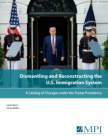Immigration Policy & Law
Recent Activity

The Colombian Response to the Venezuelan Migration Crisis: A Dialogue with Colombia’s Migration Czar
Felipe Muñoz, Advisor to the President of Colombia for the Colombian-Venezuelan Border, discusses how Colombia is coping with the influx of Venezuelan migrants, plans for future policy decisions surrounding this migration, and developments in regional and international cooperation.

This discussion marked the launch of MPI's Rethinking U.S. Immigration Policy Initiative, which aims to generate a big-picture, evidence-driven vision of the role immigration should play in America’s future, as well as to build a bipartisan center so needed reforms can be enacted.

This discussion on the 1986 Immigration Reform and Control Act (IRCA) showcases MPI Fellow Charles Kamasaki's book, Immigration Reform: The Corpse That Will Not Die. Kamasaki is joined by other veterans of the IRCA debate for a conversation on the lessons, the intended and unintended consequences, and how the law’s legacy has shaped contemporary politics on immigration.

With the U.S. administration calling for the United States to adopt a more “merit-based” immigrant selection system, this conversation focused on what policymakers should consider in designing—and managing—immigrant selection systems in a time of intense labor-market and demographic change.

At this discussion, experts from MPI and Southern Methodist University’s Texas-Mexico Center offer an overview of trends and key characteristics of highly skilled Mexican adults at the national level and for Texas, including educational levels by legal status and top industries of employment across Texas metro areas. They also discuss the policy implications of these findings.























Why the European Labor Market Integration of Displaced Ukrainians Is Defying Expectations